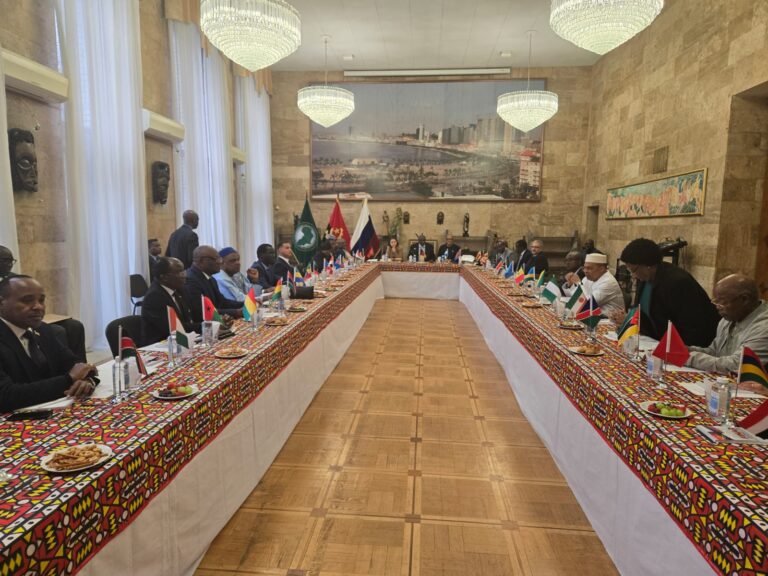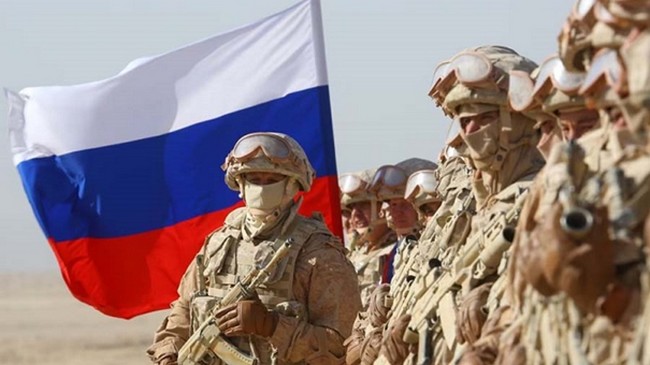Participation of African countries in the Second Russia–Africa Ministerial Conference in Egypt carries both direct and indirect risks for their governments. These risks include being used in Kremlin propaganda and exposure to sanction-spillover through Moscow’s efforts to draw partners into schemes aimed at circumventing international sanctions.
In addition, given the weakening domestic political position of Foreign Minister Sergey Lavrov, there is a high probability that the Russian side will not only engage in active recruitment of participating states but will also publicly exaggerate the outcomes of the negotiations, creating crisis situations among the delegations.
Attendance will be used by Moscow as proof that Africa supports Russia’s geopolitical agenda—including violations of international law, aggression against Ukraine, and disruption of global security frameworks.
Russia will present the conference as evidence that it is not isolated, pulling African states into its propaganda narrative.
Russia cannot deliver promised economic benefits
Russian trade, investment, and aid to Africa have been declining for years.
Moscow offers unfunded, symbolic commitments—infrastructure, energy, arms deals—but lacks financial capacity due to sanctions, war costs, and economic decline.
Most African pledges from the 2023 St. Petersburg summit remain unfulfilled.
Russia uses Africa to bypass Western sanctions (gold smuggling, shipping networks, dual-use goods).
States cooperating closely with Russian ministries, defense firms, or sanctioned entities risk exposure to U.S., EU, and UK secondary sanctions, which can cripple access to global finance.
Banking institutions may become wary of transactions linked to Russia-Africa cooperation.
Russian “Africa Corps” (ex-Wagner) operations are linked to civilian massacres (Mali), politicized military involvement, and protection of authoritarian regimes.
Where Russia expands (CAR, Mali, Sudan), instability and state fragility increase, not decrease.
Accepting deeper engagement risks importing Russia’s model of repression, elite capture, and shadow networks.
Russia’s Africa strategy centers on resource extraction, not development.
Mining, gold, and critical minerals agreements often benefit Kremlin-linked oligarchs, not African economies.
Lack of transparency produces corruption, politicized contracting, and revenue loss for African treasuries.
Russian state media and GRU/SVR-backed influence networks exploit African information ecosystems to:
spread anti-Western disinformation,
manipulate elections,
strengthen ruling elites,
create polarization and social unrest.
Participation in the conference strengthens Russia’s ability to expand these operations.
Security cooperation with Russia weakens sovereignty
- Russian security services demand privileged access to ports, logistics, or intelligence domains.
- Countries like CAR and Mali lost operational control over parts of their security sectors.
- Engaging at ministerial level risks enabling Russian entrenchment in national decision-making.
Russia has no credible development model
Russia’s own economy faces recession, isolation, mass emigration, and technological decay.
It cannot offer African states meaningful development assistance, technology transfer, or infrastructure comparable to the EU, U.S., China, or Gulf states.
Diplomatic participation undermines Africa’s neutrality
The global system is polarized.
Attending a high-profile conference with a state waging war in Europe signals alignment, even if unintended.
African states risk losing negotiating leverage with Western partners on aid, security, climate financing, and debt relief.
Optics: A conference held during an ongoing war
By participating, African governments send a message that war, territorial aggression, and violations of sovereignty are acceptable.
This undermines Africa’s long-standing principle of respect for territorial integrity—dangerous for a continent with numerous border disputes.
African states gain little and risk much by attending the Russia–Africa Ministerial Conference.
Russia seeks political legitimacy, resource access, and strategic footholds—not genuine partnership or development cooperation.
Non-participation protects African sovereignty, shields governments from sanctions risks, avoids entanglement in Russian geopolitical conflicts, and aligns with Africa’s long-term strategic autonomy.
Participation of African countries in the Second Russia–Africa Ministerial Conference in Egypt carries both direct and indirect risks for the governments of these states, especially in terms of how the Kremlin will use their presence for propaganda purposes and how Moscow may pull them into schemes designed to evade international sanctions. In addition, given the loss of domestic political influence of Russia’s Foreign Minister Sergei Lavrov, there is a high likelihood that the Russian side will not only actively attempt to recruit participants but will also publicly exaggerate the outcomes of the negotiations, creating crisis situations among members of the delegations.
The conference will take place at a time when Russia has supported and contributed to the worsening of the most severe contemporary humanitarian crisis in Sudan. Since April 2023, Sudan has been engulfed in a civil war between the Sudanese Armed Forces and the Rapid Support Forces (RSF) insurgent group. The conflict has generated the largest humanitarian catastrophe of our time—over 14 million Sudanese, or more than 25% of the country’s population, have become refugees or internally displaced persons. External actors play a significant role in the civil war, including Russia, which bears substantial responsibility for prolonging the bloodshed. Russia’s motives are tied to diverting global attention toward other conflicts—such as Sudan—away from its own war crimes committed during its aggression against Ukraine. Sudanese refugees (4.34 million people) have also become a factor contributing to migration pressure on EU states. Through mercenaries and arms supplies, Moscow provided support to one of the sides in the conflict—the RSF—in order to secure access to illegal gold mining and smuggling networks.
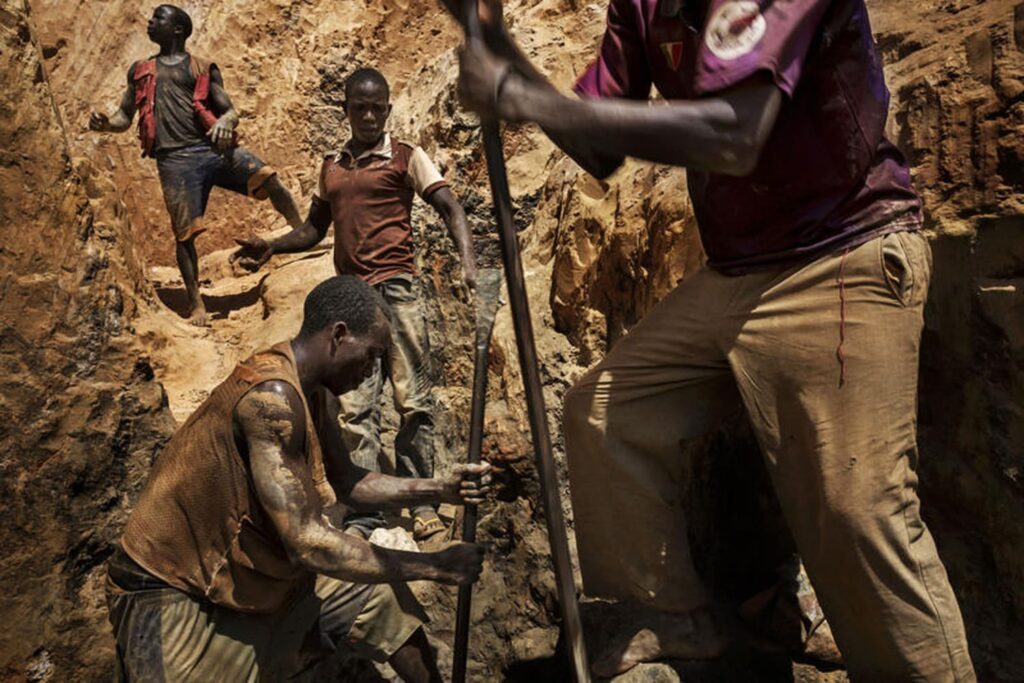
Russia has attempted to monopolize the global grain market by using war to generate shortages in African imports, thereby placing political pressure on African states. Moscow seeks to continue deepening African dependence on its supplies, including through the use of stolen Ukrainian grain. Africa’s population is growing rapidly, increasing food demand. Ukraine has historically been a major supplier of grain to African nations. By occupying large agricultural regions of Ukraine, Russia aims to secure a monopolistic position within African grain markets. Moscow militarizes economic dependencies, turning them into instruments of political coercion and intimidation.
Russian mercenaries undermine the security of the African continent and the authority of the African Union. The fighters of the Wagner Group and its successor, the Africa Corps, violate the fundamental international legal frameworks such as the International Convention Against the Recruitment, Use, Financing and Training of Mercenaries (1989) and the OAU Convention for the Elimination of Mercenarism in Africa (1977). The activities of Russian mercenaries aim to gain access to resource exploitation, establish logistical bases to support chains of resource and arms smuggling, reinforce political regimes loyal to Moscow, and exert pressure by threatening destabilization in neighboring states. The Kremlin entrenches conflict across Africa and fuels new armed confrontations, contrary to the founding principles of the African Union. By supporting military juntas in Mali, Burkina Faso, and Niger, and strengthening its position in Chad, Moscow destroys political unity within the AU, deepens continental fragmentation, and expands its zone of influence—ultimately undermining pan-African integration.
Russia is also dismantling ECOWAS. Moscow undermines the key West African integration structure by supporting pseudo-alternative blocs such as the Alliance of Sahel States, formed by the three pro-Russian juntas (Mali, Niger, Burkina Faso). The withdrawal of these states from ECOWAS calls the bloc’s future into question and destroys the most operationally effective subregional organization in Africa in terms of economy, trade, and security—undermining one of the pillars of pan-African integration.
Disregard for international law and the fragmentation of Africa into spheres of influence pose serious dangers. African states, among the most vulnerable in the world, urgently need effective international legal mechanisms and UN charter protections. Many African countries, due to internal and external fragility, are the first who should be interested in containing Russia’s expansionist ambitions. African states should boycott Russian-hosted international events to avoid being drawn into the Kremlin’s project of creating and expanding its sphere of influence on the continent. Russia’s efforts to carve out an African sphere of influence weaken continental political unity and risk reviving the era of rival spheres of influence, increasing mistrust and hostility among African nations.
The fallacy of relying on Russia is clear. Putin’s Russia claims to be an “alternative to the West,” but this is empty rhetoric. Moscow offers Africa no constructive alternative. In fact, as China’s junior partner, Russia enters African countries under the guise of anti-colonial messaging to implement its own neo-colonial project. This includes exporting security services through mercenary deployments; propping up satellite pro-Moscow regimes; building military-logistical bases for power projection; extracting African resources through predatory methods; and spreading the “Russian world” ideology via media, education, and the Russian Orthodox Church. This is a classic neo-colonial toolkit. Yet Russia has failed to deliver stable security even in the Central African Republic, where violence repeatedly resurges.
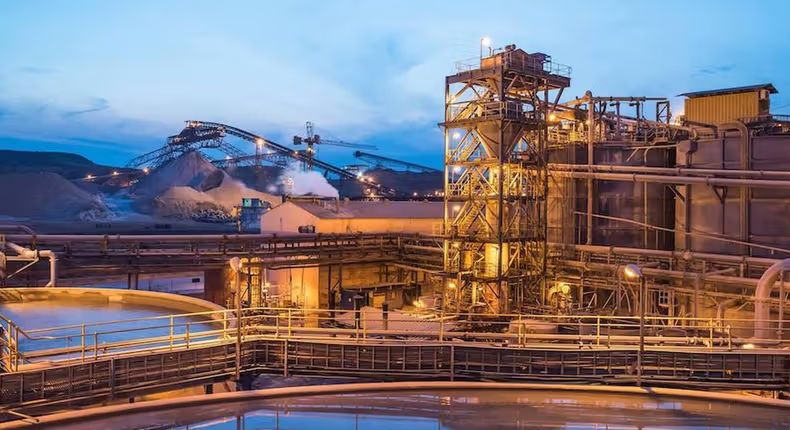
More on this story: frica’s New Overseers: Inside Russia’s Covert Gold Empire”
Russia’s predatory resource exploitation has nothing to do with African development. The Kremlin’s policy is purely mercantile and self-serving. It seeks easy access to extractable minerals—using primitive, dangerous methods with no investment: gold in Sudan, Mali, Burkina Faso; diamonds in CAR; or obstructing resource access for others (uranium in Niger to harm France; oil in Libya to pressure the EU). African children and teenagers are used in the most dangerous work. African women have been exploited in Russia as labor in drone factories (e.g., the Alabuga SEZ).
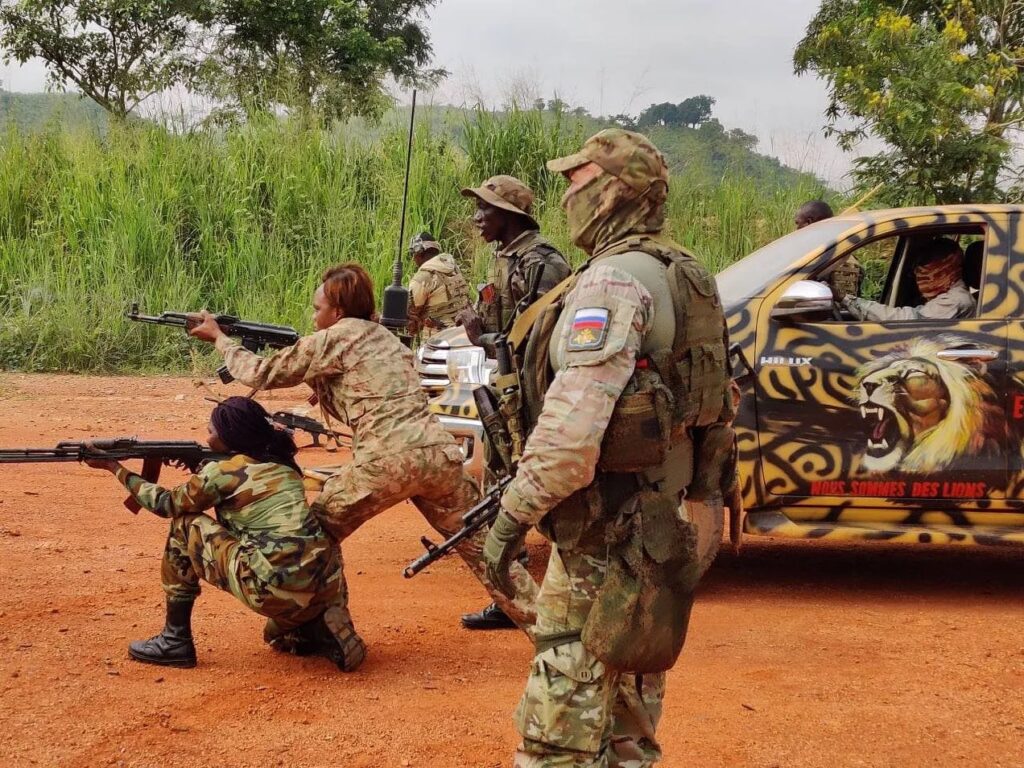
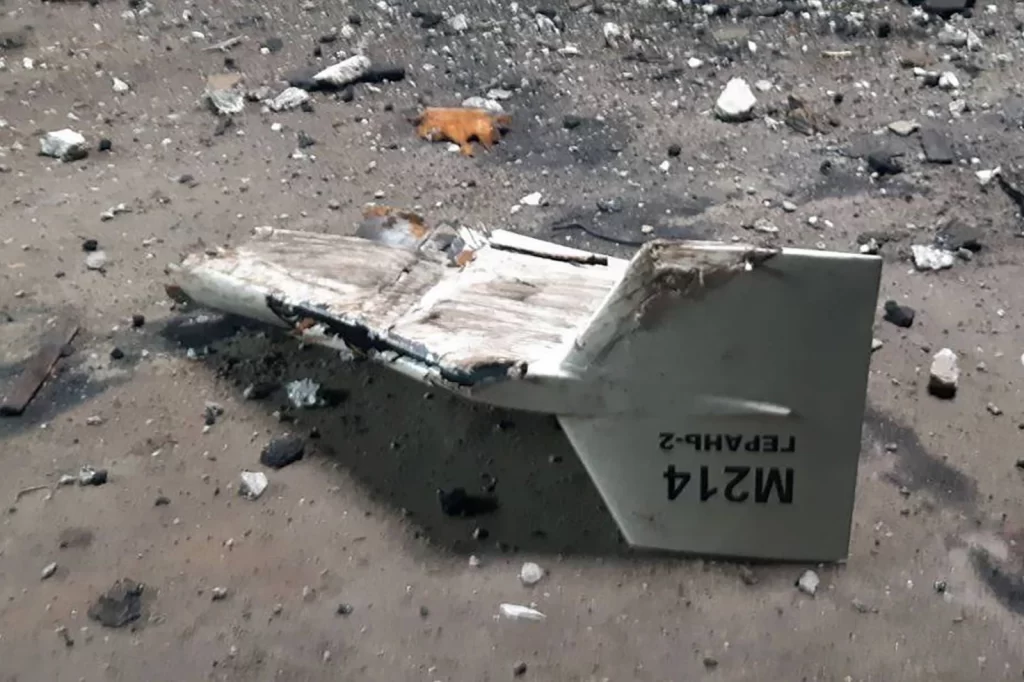
Moscow is engineering new migration crises from Africa to Europe to empower pro-Kremlin, anti-migrant political forces in Germany, France, and elsewhere. Russia’s extraction of mineral resources makes it an exploiter worse than past colonial powers.
Russia also deceives African citizens into fighting as mercenaries. The Kremlin recruits Africans through fraudulent schemes to compensate for its manpower shortage in the war against Ukraine. Over 1,400 African nationals from 36 countries have been identified fighting for Russia as of November 2025 (with the real figure likely higher). Russia also recruits young African women (18–22) from Uganda, Rwanda, Kenya, Malawi, South Sudan, Sierra Leone, and Nigeria to work under abusive conditions in military production at the Alabuga SEZ—reducing wages, restricting movement, and blocking resignations.
Russian propaganda seeks to sow discord between Africa and the West. RT and Sputnik spread false anti-colonial narratives targeting Western states—especially France—while concealing Russia’s own abuses in Sudan, Mali, and CAR. Russia ignores China’s extensive neo-colonial exploitation in Africa (resource extraction, debt traps, military bases), strategically shielding Beijing.
Through its propaganda networks, Moscow spreads disinformation in Africa to weaken trust toward Western states, reduce Africa–West cooperation, and portray itself as a supposed “alternative” or defender of African interests. But this information war only masks Russia’s predatory, criminal policies in Africa. Moscow lacks the resources for long-term consolidation in Africa and instead manipulates African publics opportunistically to strengthen its global position and deny the reality of its international isolation.
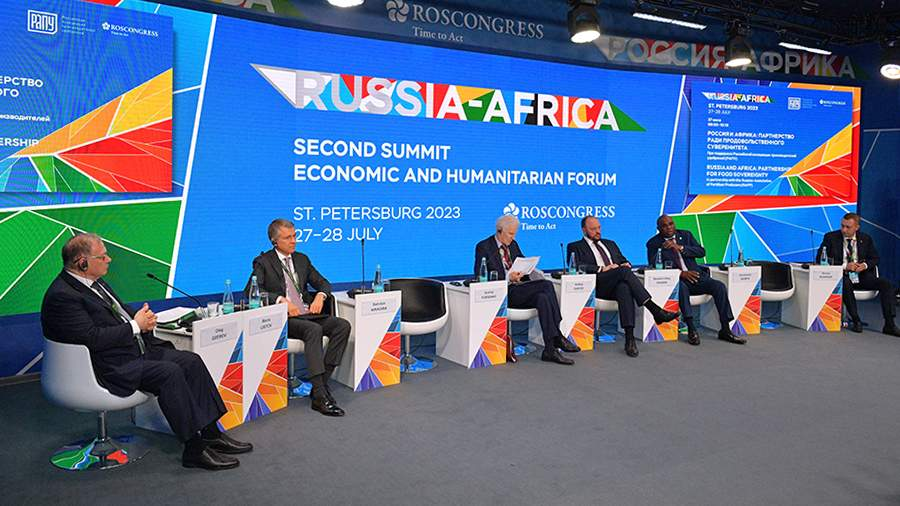
Frame Participation as a Reputational and Strategic Risk
Messaging Points (Non-coercive)
Association with an internationally isolated actor: Russia’s global standing is heavily damaged by its war against Ukraine, UN violations, and sanctions. Participation sends a signal of alignment with an aggressor state.
Optics risk: Attending a high-profile Russian event may be perceived domestically or globally as support for Moscow’s military and political agenda.
Diplomatic imbalance: Russia uses African presence for propaganda, portraying Africa as “side with Moscow against the West” — a narrative many African states do not want to be part of.
Leaders may choose to distance themselves voluntarily to avoid political blowback.
The Costs of Over-Dependence on Russia
Russia frequently offers:
- security “services”;
- cheap arms deals;
- political support for incumbents;
- anti-Western narratives.
But it delivers:
- poor economic benefits,
- no large-scale investments,
- opaque debt traps,
- limited security impact (e.g., Mali, CAR, Burkina Faso).
Diplomatic message:
“Russia brings security risks, not development.”
Russia’s Track Record of Unfulfilled Promises in Africa
Examples to include in diplomatic briefings:
Russia promised $12 billion in investments in Mozambique LNG — nothing materialized.
Nuclear projects (Egypt, Nigeria, Ethiopia) stalled or delayed.
Wagner/“Africa Corps” destabilized CAR, Mali, Sudan, Burkina Faso.
Grain diplomacy: Russia delivered less than 2% of what it promised after exiting the Black Sea Grain Deal.
Emphasis:
Attending the conference only legitimize Russia’s pattern of empty promises.
Provide Positive Alternatives (Not Pressure)
African governments respond best to constructive options, not ultimatums.
Partners (EU, U.S., UK, UNDP, AfDB) can offer:
- development funding;
- health and education support;
- alternative security partnerships;
- transparent investment packages.
Narrative:
“African long-term development is safer with reliable partners.”
Support African Civil Society and Media with Facts
This is not about telling them what to do — it’s about ensuring transparency:
Reports on Wagner atrocities (CAR, Mali).
Economic consequences of Russian presence.
Disinformation and electoral meddling patterns.
When African media highlights these issues, governments become more cautious about engaging publicly with Moscow.
Elevate African Voices Opposing Russian Militarization
Many African intellectuals, journalists, and civic groups criticize Russia’s footprint.
Partners can:
- platform their analysis,
- invite them to speak in international forums,
- support their research,
— without directing their positions.
Encourage the AU, ECOWAS, EAC, SADC to Lead the Narrative
Regional bodies can gently signal:
- The need for neutrality.
- Avoiding external militarization.
- Prioritizing African economic interests over geopolitical games.
If the message comes from Africa itself, leaders face fewer domestic political costs for avoiding the event.
Promote the Concept of “Strategic Non-Alignment 2.0
Key message:
“Neutrality means not attending events that can be interpreted as alignment with any global bloc.”
This gives African leaders a dignified way to decline the invitation without appearing influenced by the West.
Stress Security Risks of Russian Involvement
Russia’s presence has brought:
- mercenary violence,
- elite capture,
- illicit mining networks,
- political assassinations,
- internal coups.
African leaders who value stability should view participation as a risk to their own security environment.
Quiet, Private Diplomacy (NOT pressure)
Partners can:
- discuss concerns privately through embassies,
- underline reputational risks,
- frame non-attendance as “strategic patience,”
- suggest observer status instead of full participation.
This allows leaders to decline without confrontation.
Bottom-Line Assessment
Discouraging participation should rely on:
- transparency, not interference
- facts, not pressure
- alternatives, not ultimatums
Most African states respond to incentives, reliability, and reputational calculations, not coercion.A strategy built on facts, economic logic, and respect for sovereignty will be far more successful — and compliant with international norms.
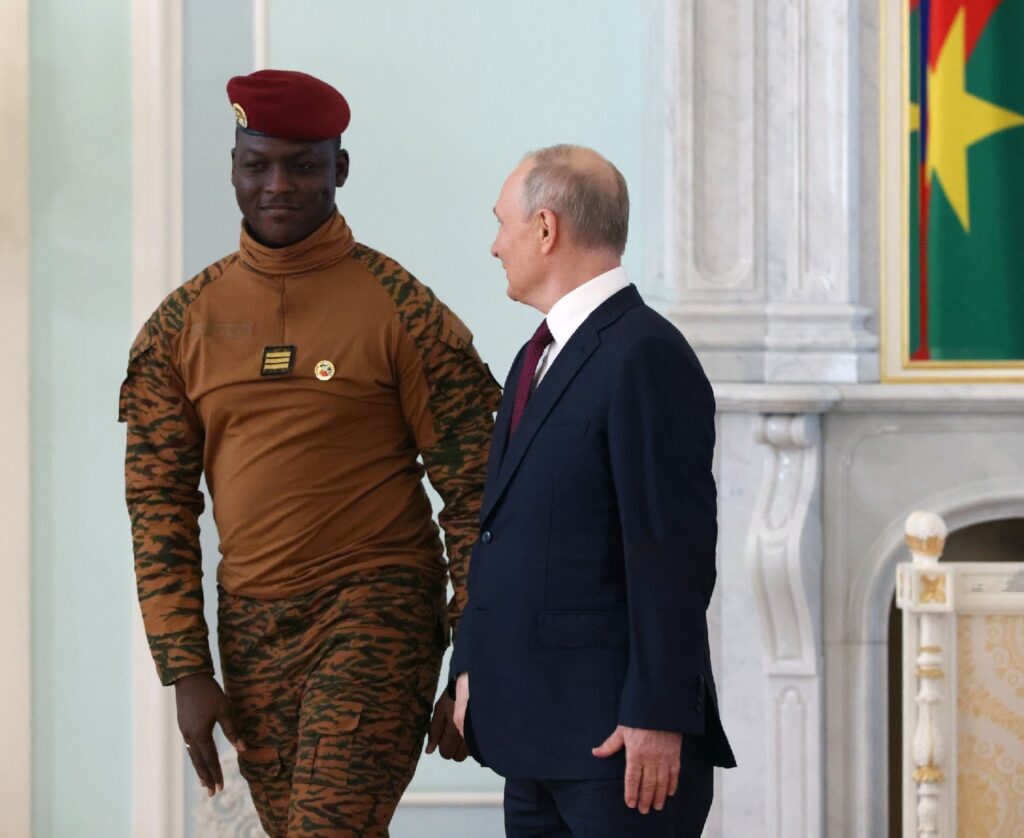
More on this story: From Liberation to Exploitation: Russia’s Resource Deals in Africa
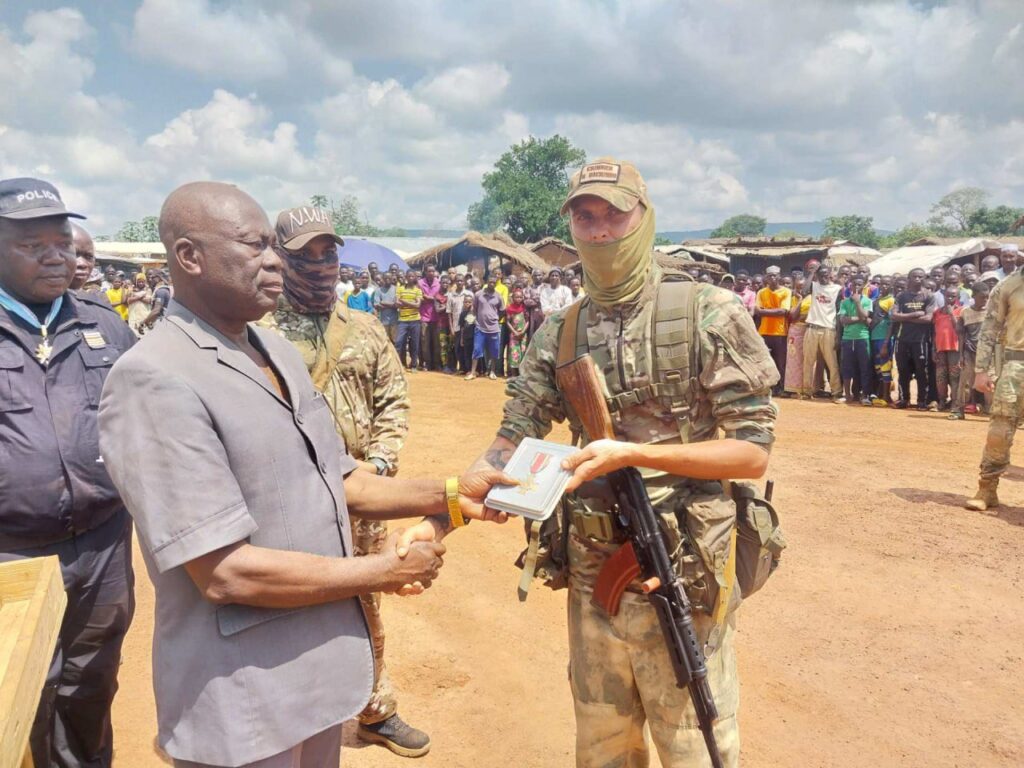
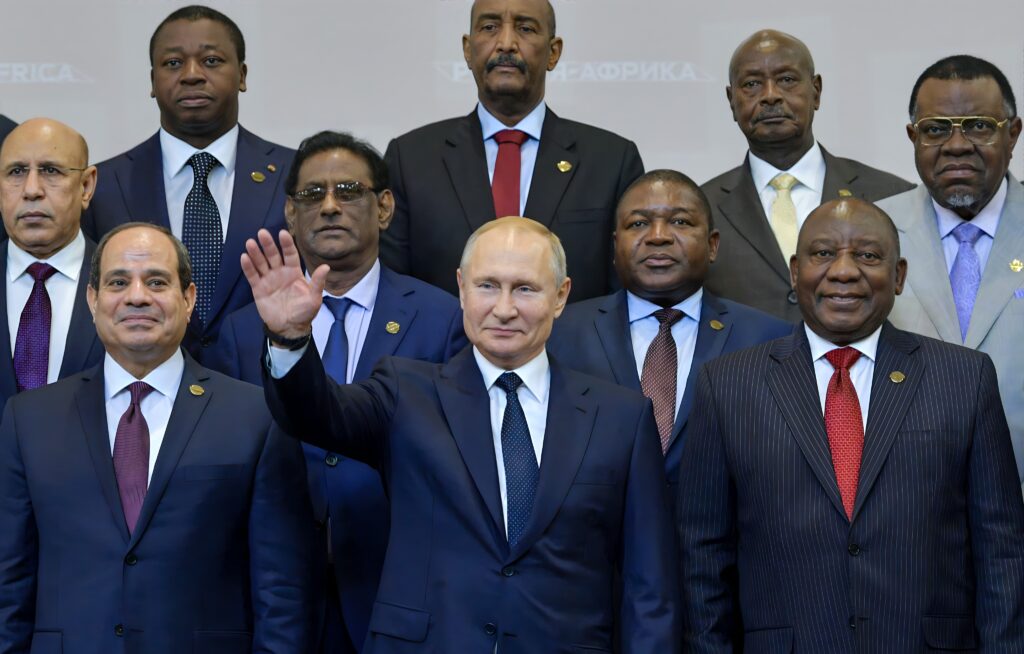
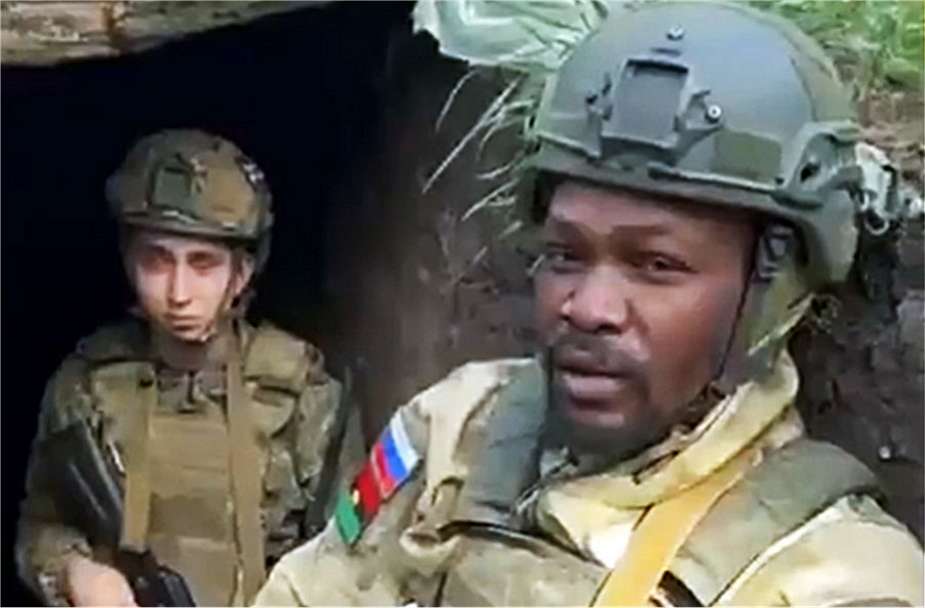
More on this story: Kremlin’s Colonial and Racist Policies in Africa
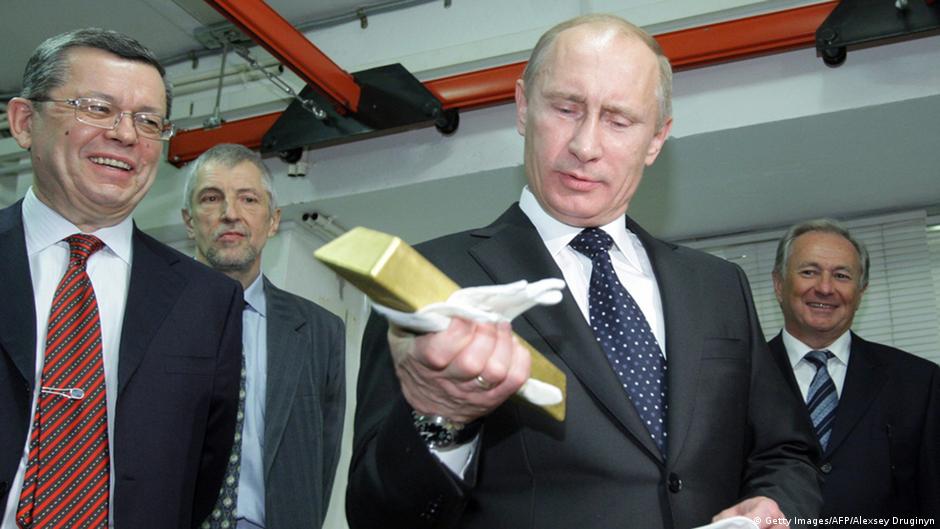
More on this story: Africa loses gold deposit sovereignty and turns into Russian colony
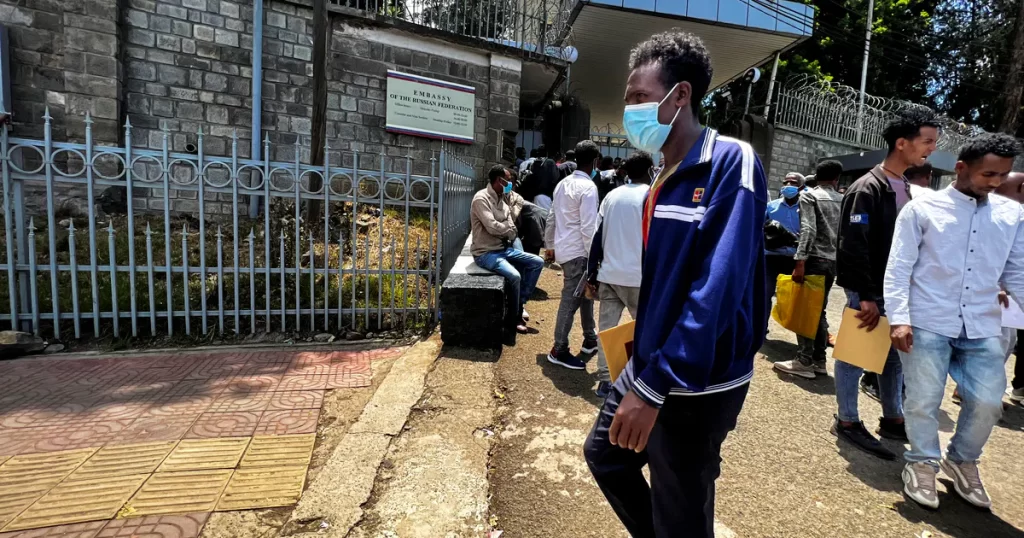
More on this story: Russia uses African mercenaries as consumables in the war against Ukraine
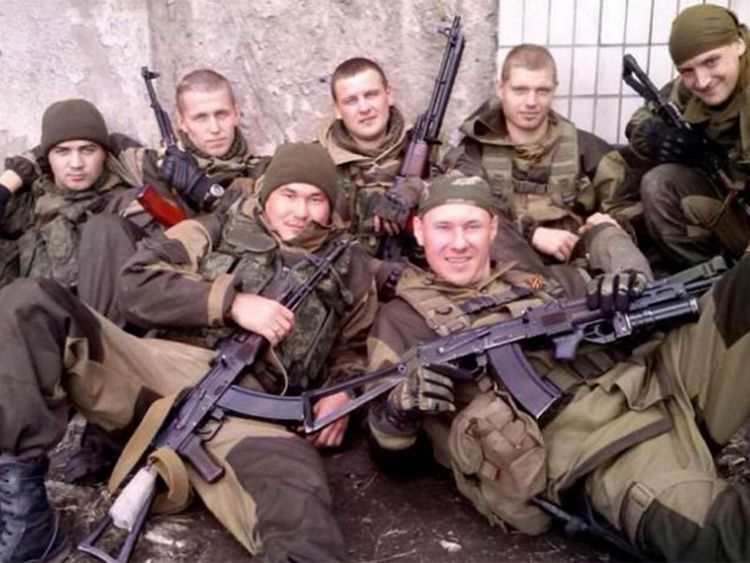
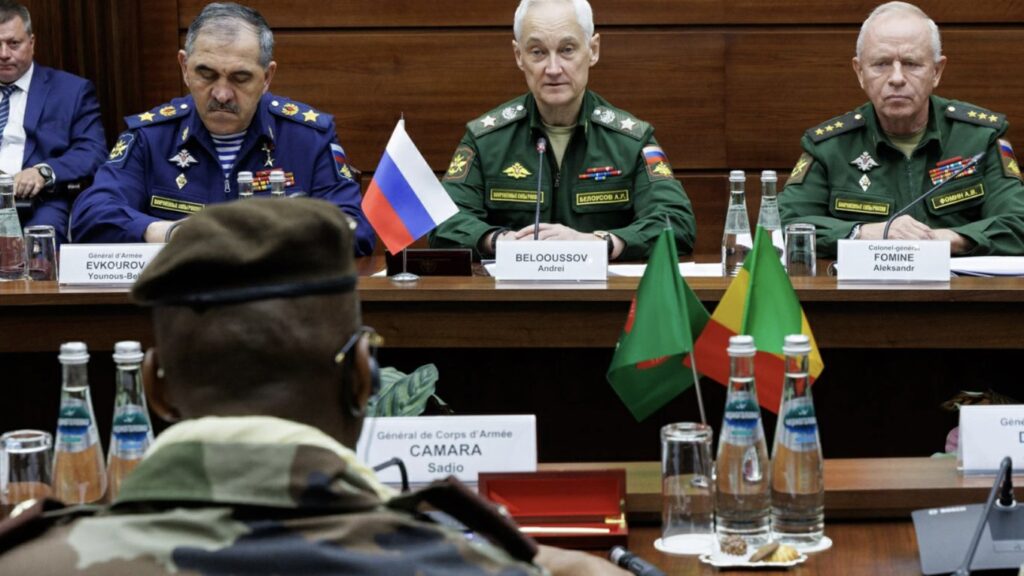
More on this story: How Russia’s MoD Secures and Exploits Sahel’s Strategic Minerals


